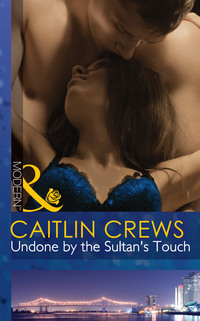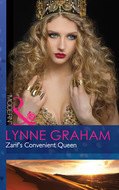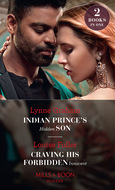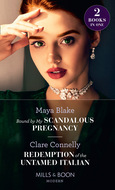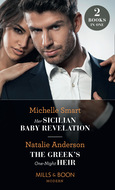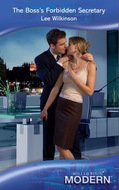Książki nie można pobrać jako pliku, ale można ją czytać w naszej aplikacji lub online na stronie.
Czytaj książkę: «Undone By The Sultan's Touch»
Khaled would take her from the palace and Cleo would finally, finally be his in every possible way.
That same fire she’d tasted that night three months ago simmered in her at the thought, making her cheeks heat, making her stomach clench in delicious anticipation, making her feel hungry and wild despite all the eyes trained on her.
Almost as if he’d left them both unfulfilled deliberately.
“Where are we going?” she asked when Khaled finally took her by the hand and led her from the banquet to the sound of many cheers, though the truth was she didn’t care at all as long as he was with her.
“You will see when we get there,” Khaled told her, and then he smiled down at her in a way that made her quiver deep inside, all that dark intent on his fierce face, all of his focus on her at last. At last. “Though I must warn you, wife, that I doubt you will see much at all outside my bed.”
CAITLIN CREWS discovered her first romance novel at the age of twelve. It involved swashbuckling pirates, grand adventures, a heroine with rustling skirts and a mind of her own, and a seriously mouth-watering and masterful hero. The book (the title of which remains lost in the mists of time) made a serious impression. Caitlin was immediately smitten with romances and romance heroes, to the detriment of her middle school social life. And so began her lifelong love affair with romance novels, many of which she insists on keeping near her at all times.
Caitlin has made her home in places as far-flung as York, England, and Atlanta, Georgia. She was raised near New York City, and fell in love with London on her first visit when she was a teenager. She has backpacked in Zimbabwe, been on safari in Botswana, and visited tiny villages in Namibia. She has, while visiting the place in question, declared her intention to live in Prague, Dublin, Paris, Athens, Nice, the Greek Islands, Rome, Venice, and/or any of the Hawaiian islands. Writing about exotic places seems like the next best thing to moving there.
She currently lives in California, with her animator/comic book artist husband and their menagerie of ridiculous animals.
Undone by the
Sultan’s Touch
Caitlin Crews

MILLS & BOON
Before you start reading, why not sign up?
Thank you for downloading this Mills & Boon book. If you want to hear about exclusive discounts, special offers and competitions, sign up to our email newsletter today!
Or simply visit
Mills & Boon emails are completely free to receive and you can unsubscribe at any time via the link in any email we send you.
Contents
Cover
Introduction
About the Author
Title Page
Chapter One
Chapter Two
Chapter Three
Chapter Four
Chapter Five
Chapter Six
Chapter Seven
Chapter Eight
Chapter Nine
Chapter Ten
Extract
Endpages
Copyright
CHAPTER ONE
THE GIRL CAME out of nowhere.
Cleo Churchill stamped on the brakes in her tiny rental car, gasping as the car swerved before coming to a jolting halt in the narrow little alley of a road somewhere deep in the twisting, ancient heart of the capital city of Jhurat.
For one panicked heartbeat, then another, she thought she’d been seeing things. The blazing desert sun was only then beginning to drop behind the ornate historic buildings, making the shadows lengthen and stretch. She’d lost her way in the tangle of old streets and one city looked very much like another after six months of traveling all around Europe and into the Middle East. And more to the point, there was absolutely no reason a girl should dive in front of her car—
But there she was, young and wide-eyed and startlingly pretty behind her flowing scarves, right there at the passenger window—seemingly unharmed.
I didn’t hit her, thank God.
“Please!” The girl spoke through the car’s open window, desperate and direct. “Help me!”
Cleo didn’t think. The adrenaline of the near miss hummed through her with an almost sickening electricity, but she motioned toward the door, aware as she did it that her hands were shaking.
“Are you all right?” she asked as the girl wrenched open the door and threw herself inside. “Are you hurt? Do you need—?”
“Drive!” the girl cried as if pursued by demons. “Please! Before—”
Cleo didn’t wait to find out before what. She’d escaped her own demons, hadn’t she? She knew how it was done. She stepped on the gas pedal, scowling as she concentrated fiercely on the narrow road in front of her, which she dearly hoped led back out of this maze of ancient narrow streets that wound erratically around Jhurat’s central palace, home to its governing sultan. Beside her, the girl breathed heavily and high-pitched, as if she’d been running.
“You’re okay,” Cleo said, trying to soothe her—or even herself. “We’re okay now.”
And then a man stalked out of the shadows, directly into the car’s path, as if daring Cleo to run straight into him. She heard herself gasp out a curse, but her eyes were fixed on him as surely as if he’d demanded it.
He was tall and fierce, forbidding and uncompromising in the loose robes that marked him a local—a wealthy local—and did nothing at all to conceal his markedly powerful form. The sun was behind him and hid his face, but Cleo could still feel the weight of his stare. Like an impossible knot in her own chest.
He stood there in the center of the road, imperious and bold. He crossed his arms over his broad chest and waited—and it wasn’t until she realized he wasn’t moving that she also realized she wasn’t, either. That she’d stopped the car directly in front of him as if he’d held up his hands like a police officer and commanded it.
When all he’d done was stare.
Despite herself, Cleo shivered. Foreboding. Fear.
And something else, maybe, beneath it, that she’d never felt before.
He bit out something ferocious in Arabic that made the girl beside her jerk in her seat as if he’d slapped her, and Cleo’s stomach twisted.
This is not good, she thought.
“Get out of the car,” he said then, his voice deep and autocratic, and it took a long, shuddering moment for Cleo to realize that this time, he was speaking directly to her. Issuing an implacable order in a language she could understand, right through the glass. “Now.”
“Who is that?” she whispered, still unable to pull her gaze away from him. He was simply too mesmerizing. Too powerful.
The girl beside her let out a sound that was something like a sob, but far angrier. When Cleo finally managed to yank her attention away from the dark and dangerous man taking over the road before them, the girl’s jaw was set in a stubborn line, and her mouth trembled. Making her look even younger than Cleo had originally thought she was.
“That,” the girl said bitterly, staring out the front window at the man who still stood there, not moving an inch, as if he expected it to be nothing but a matter of moments before he was obeyed, “is His Excellency, the Sultan of Jhurat.”
This was, Cleo realized dimly then, a great deal worse than not good.
“What?” she asked weakly, that thudding panic hitting harder, sending out shock waves. He didn’t look like a sultan. He looked like some kind of warrior angel, sent down to smite and awe. She felt both smitten and awed, the sensations too hot and almost painful inside of her. “Why would a sultan—the sultan—chase you down an alley?”
“Because he is a demon from hell.” The girl’s mouth twisted. “He is also my brother.”
Cleo swallowed, hard.
He stood there, waiting. And now she understood what that proud ruthlessness meant. What that thing was that emanated from him like a force field, rendering the whole city small and inconsequential beside him.
Cleo’s mind raced, and for some reason, she thought of Brian then. Weak, lying Brian. Brian, who had humiliated her. Brian, who had said he loved her but couldn’t possibly have meant it, could he? Brian, who she’d believed so completely when he’d never had even a shred of the intensity or authority the man before her simply...oozed.
The sultan jerked his head in a silent yet remarkably eloquent command to exit the vehicle.
Immediately.
And Cleo forgot about stupid, cheating Brian and the girlfriend he’d kept on the side for almost the entirety of their doomed engagement.
This was exactly the kind of thing she’d promised her parents back in Ohio would never happen to her, because she’d imagined she was too smart, or too cynical, to fall prey to scenarios like this. This was exactly what her mother and her hysterical aunts had predicted would happen if she did something so radical as explore the world by herself. She could practically hear the doom-and-gloom predictions they’d all shared with her whether she’d wanted them to or not, like a going-away present, as if they were whispering it in her ear from across the planet.
They’d begged her not to do this. They’d told her running away from her problems was only running straight into new ones. And now look what had happened.
The sultan waited. Less patient by the moment.
“Just drive over him,” the girl beside her demanded. “Mow him down where he stands.”
“I can’t,” Cleo said, except she found she was whispering. “I can’t do that.”
And everything seemed to slow down, as though the air was made of syrup and there was nothing but him. That man. The sultan. She shifted the car into Park. Beside her, the girl let out a frustrated noise, but Cleo’s attention was riveted on the man at the end of her bumper.
Still. Watchful. Ferocious.
Her neck prickled with a deep foreboding. With anxiety. With the sense of immensity, as if what she was about to do was already sealed in stone, as ancient and unmoving and inevitable as the venerable city around her, as the old streets beneath her.
As the man before her. The sultan of all he surveyed.
Who couldn’t be weak, she knew somehow, if he tried.
Cleo turned off the rental car’s ignition with a decisive click and then opened her door, ignoring the girl in the passenger seat as she got out and stood there.
The sultan moved then. He nodded at someone behind her and men in military uniforms appeared as if from thin air, surrounding the rental car, all wearing machine guns that dwarfed their bodies.
Cleo didn’t understand a single word of the rapid-fire Arabic, all shouted back and forth in so many harsh and loud male voices, and yet somehow she couldn’t bring herself to look away from the sultan as he continued to stand there staring back at her.
One of his men appeared beside her and held out his hand, making Cleo flinch. She glanced at him, then back at the sultan, aware then of how fragile she was. She felt it in ways she never had before. Fragile and exposed and frighteningly vulnerable.
And it was still better than how Brian had made her feel, two weeks before their wedding, when she’d come home early from work and found him on the living room floor of his condo with that woman.
The sultan said something, and she realized it wasn’t the first time.
“I’m sorry, I didn’t hear you,” she said, and she hardly sounded like herself.
He paused, and she wished she had something more than this shadowy impression of his face. That the sun would hide behind the buildings at last so she could look at him without her eyes watering. So she could convince herself that he was neither as cruel nor as inhuman as he appeared while backlit like a god.
So she could tell herself that the twisting heat that knotted her belly, low and hot, was based on something more than the intuition she’d learned better than to trust.
But his voice, when it came, was as calm as it was deep, despite the tension she could hear beneath it, and for no reason at all, it eased her. Even as it set her on fire.
“Do you know who I am?”
“Yes.”
A faint nod. “Give my man your keys.”
An implacable order delivered in perfect English, with a crisp British accent to boot. Cleo knew she should ask questions. Demand to know what was happening to her, what he planned to do next. Instead, she simply obeyed.
She opened her hand and the man beside her took the keys from her palm, and the whole time she was lost in the will of the powerful man whose face was still in shadows before her.
Why couldn’t she seem to breathe? Why did it feel as if the earth were buckling beneath her feet when she could see—because no one else was reacting to it, no one else was moving, the car was solid and unmoving beside her—that it was only happening inside of her?
Everything seemed to stretch out, slow and taut, but then the car engine turned over beside her, the men and the car and the angry girl disappeared after a brief consultation, and Cleo was standing alone in an alleyway in a foreign country with a man so great and powerful he held a title she’d half believed only existed in books.
He moved then, and she wished he hadn’t. He was like liquid, a threat wrapped in poetry, athletic and menacing at once. The knot inside her pulled taut, red and hot. Cleo stood still as he walked in a slow circle around her. He held something in his hands and she realized it was the wallet she’d left sitting in one of the cup holders in the car. One of his men must have—
“Eyes on me,” he ordered her, his voice a silken command.
And when she jerked her attention back up from her wallet to his face, she could see it, finally. Could see him.
Beautiful, something whispered inside her, though he wasn’t.
He was much too fierce. He reminded her of those remote villages she’d found in her travels, clinging to the sides of rugged mountains long days from anywhere, proud and breathtaking and unimaginably tough. He had thick dark hair and a poet’s face made shockingly masculine by a warrior’s cool, light gaze and the sort of tough jaw Cleo associated with soldiers and martial artists—and thugs. A blade of a nose. Faint lines around his eyes suggested he must have smiled at some point in his life, but she couldn’t imagine it. He seemed carved entirely from stone.
He looked so masculine and so inarguably fierce it was almost as if he and soft, round-faced, nice-looking Brian were of a different species. She told herself that was why her heart beat so fast. Because he was the not Brian.
And because he really was beautiful.
“You are American.”
It wasn’t a question.
“Yes.”
His gaze moved over her and she had to fight not to squirm. She was wearing dark trousers and scuffed boots beneath a loose-fitting T-shirt, and a dark jacket as much to cover herself in this conservative part of the world as to block the faint chill in the air, hinting at the coming fall night. She’d twisted her long hair back, but the long day had coaxed some of it down again, strands falling forward messily and making her feel much younger than her twenty-five years.
Cleo didn’t want to ask herself why, exactly, she wished there was something more in his dark gaze then. Something to match that heat inside her.
He flipped open her wallet and looked inside. “You are a very long way from Ohio.”
“I’m traveling,” she said, and her voice sounded strange. Huskier than usual. Raw, somehow. “Backpacking.”
“Alone?”
She didn’t want to admit that, for some reason. For a hundred reasons. But he lifted his gaze from her wallet and the license he was presumably studying, and she felt hot. Caught.
“Yes,” she said, fighting to sound normal. “It’s been six months. I fly home in two weeks.”
And the truth was, she didn’t want to go back. Not yet. Maybe not ever.
“Unless, of course, you find yourself detained,” he said, as if he could read her mind.
She frowned. “Why would I find myself detained?”
“A prison sentence would be considered a lenient penalty in this country for a foreign national caught in the act of kidnapping a member of the sultan’s family,” he said, almost casually.
It was undoubtedly suicidal to scowl at this man. But Cleo only thought about that after she did it.
“I didn’t kidnap anyone. Your sister ran in front of my car. Should I have flattened her beneath my tires?” She didn’t remember herself so much as see that incredulous expression on his face, and she coughed once. Delicately. “I thought I was helping. And also not committing vehicular manslaughter.”
The sultan stared at her for a moment, that incredulous expression shifting to something else. Something far more dangerous.
“What do you imagine my sister was running from?” he asked, and it occurred to her that his easy, casual tone was in truth neither of those things.
“Maybe you’re marrying her off? To some ally or other?”
But that notion came from novels she’d read, not any particular knowledge about this place or him, and he seemed to know that. Even to expect it, she thought, when his slate-gray eyes darkened.
His magnificent mouth, already close to cruel in its beauty, thinned. He watched her for a moment, his cool gaze like a fire inside her, turning her inside out.
That had to be panic, she told herself, but she knew better.
“What a vivid imagination you have, Miss Churchill.”
She didn’t want him to know her name. She didn’t want him to look at her like that, or at all. She wanted to run.
Except she really didn’t. She’d been running for six months. This was the first time she’d wanted to stand still instead. Cleo couldn’t let herself think too much about that. It made the heat in her burn hotter.
“Your sister didn’t tell me what she was running from,” she said, somehow sounding far cooler than she felt. And not because she couldn’t seem to do anything but obey him, no matter if the order he gave her was silent, conveyed by those smoky gray eyes that she found as unnerving as she did mesmerizing. “She jumped in the car, that’s all. And then you appeared before us like every horror-movie villain in the history of mankind. Only without an ax. Happily.”
Again, that arrested look. That slow blink, as if he couldn’t believe she’d said that. Neither could she.
“My sister is sixteen.” His voice was low. Measured. “She doesn’t wish to return to her boarding school. What you interrupted was a tantrum.”
“She asked for my help,” Cleo said staunchly, and found herself lifting up her chin in a defiance that had to mean she had some kind of death wish. “And I’m not going to apologize for helping her, no matter how ferocious you become.”
He studied her, cold and fierce and impassive. He is a sultan, her brain kept reminding her. This is deeply, deeply foolish. He could do as he liked with her, and they both knew it. Mouthing off to a man like this had to be right up there in the top two dumbest things she’d ever done, right next to trust Brian.
“You are fortunate, I think, that I don’t require your apologies,” he told her, and yet the way he said it made her feel anything but fortunate, despite that glowing knot of heat low in her belly. “But I’m afraid you must come with me anyway.”
* * *
Khaled bin Aziz, Sultan of Jhurat for the moment—assuming he could keep clinging to his country by his damned fingernails—stood outside the small private foyer in the old palace where his guards had sequestered the American girl, and considered his next move.
His sister had been taken to her rooms—where she would remain until morning, when his guards would personally transport her to her boarding school in the countryside and make sure her teachers there were prepared to monitor her movements more closely. He knew it wasn’t Amira’s fault that she acted this way, so heedless and irresponsible, kicking up the kind of trouble she couldn’t possibly understand had far-reaching consequences.
Khaled could remember being sixteen and angry at everything himself, but, of course, he hadn’t had the luxury of indulging either his youth or his temper. He’d been too busy bearing the brunt of his responsibilities as their father’s heir.
You do not matter, his father had told him when he was barely eight and then with great regularity thereafter. Only Jhurat matters. Accept this truth.
Nor could Khaled indulge his own temper now. There was too much at stake. Trade negotiations with Western powers who took such pleasure in believing him a barbarian for the kind of commerce that Jhurat very much needed to secure if it was going to escape the curse of endless poverty that had afflicted so many of its neighbors, and had nearly crippled it, too, beneath the weight of his father’s paranoia and attempts to alleviate his own guilt.
Open the borders and you open Pandora’s box, his father had predicted balefully in one of his coherent moments, but it wasn’t until now that Khaled had fully understood what he’d meant.
He didn’t blame Amira, but he could kill her all the same for throwing him neck-deep into problems he wished someone else could solve. But that was what happened upon inheriting a country far earlier than expected after its ruler, his father, had collapsed and had been declared incompetent: there was no one else. These problems were Khaled’s alone.
“She is no one of importance,” his head of security, Nasser, said quietly from beside him, his gaze on the sleek computer tablet in his hands. “Her family is unremarkable. Her father is an electrician and her mother works in a doctor’s office in a small town on the outskirts of what appears to be a very small city in the middle of the country. She has two sisters, one married to a mechanic and the other to a teacher. No ties to anyone with any sort of influence at all.”
“Ah,” Khaled said, more to himself than Nasser, “but that only means she is one of their ‘every women.’ I learned at Harvard that Americans love nothing more than to tell themselves fairy stories in which little brown mice become great and powerful through their own inner strength, or some such nonsense. It is part of their cultural DNA.”
Inside the room, his own little brown mouse sat on one of the settees, bent over at the waist, elbows on her knees and her forehead cradled in her hands. He thought she was simply breathing deeply, not weeping. Not this one, with her talk of villains and axes and her foolish courage. He’d seen the hint of fear in her eyes when he’d ordered her back to the palace. He’d scared her, he knew, and if he regretted that—if he regretted the necessity of squelching that spark of defiant fire that had transformed her from a mouse into something far more interesting out in that alley, if he regretted the man he’d become that he could do these things so cavalierly—he ignored it.
There was no place for regret. There never was. There was only Jhurat.
“She has been traveling, as she said,” Nasser continued after a moment, diplomatically opting not to comment on either fairy stories or mice, which was only one of the reasons he’d been Khaled’s right hand and best friend since they’d been boys. “She flew to Scotland six months ago and has been wandering since, following what appears to be a largely whimsical itinerary south and east. One of those gap-year journeys, it seems, though she finished her university studies some years back. Perhaps she is ‘finding herself’?”
Khaled snorted at his aide’s dry tone. “And instead she found me. Poor little mouse.”
“There is no need for you to deal with this situation any further if you don’t wish it,” the other man said then. “We can handle a girl. Especially one who cannot possibly cause a single ripple, no matter what becomes of her.”
“And can you handle our enemies, too? Who even now work to have me removed from the palace because of my tainted blood?” What they whispered was that Khaled’s line was weak, that the son would inherit his father’s dementia before his time. And who was to say they were wrong? He shoved that aside. “I am certain they have already leaked the fact that I have a young female American in custody to the papers. It is inevitable.”
“The papers can be dealt with.”
“Our papers, perhaps.” But that was how his father had done things, and look what it had wrought: this mess Khaled had to clean up, though he often doubted he could. He doubted anyone could, but it was his duty—his fate—to try anyway, no matter what happened. “But what happens when they take it to the international stage? Which they are certain to do.” Because it was what he would do, and Khaled had the peculiar pleasure of knowing his enemies well. “How will we look to the world when I am painted as some kind of monster who abducts fresh-faced young American girls from the streets?”
He already knew what it would do to the contracts they needed to lock down to bring commerce to the country. To say nothing of the much-needed influx of international wealth, which, with the increase in tourism since he’d opened the borders again, might tip the scales in Khaled’s favor. In Jhurat’s favor, at long last.
He couldn’t afford any backsliding. Not now.
“The people do not want to revert to the Stone Age,” Nasser said darkly. “They want their movies and their technology right along with their paychecks from all the new jobs. No matter what that fool may tell himself.”
“That fool” was Talaat, the leader of the resistance movement that opposed Khaled’s claim to the sultanate with the assertion that Khaled’s blood was tainted with the same infirmity of mind that had taken his father down. Can we risk the country? Talaat liked to ask on the news and all over the papers, so reasonably.
Talaat was also Khaled’s cousin on his mother’s side. They’d played together as small boys. It made a kind of poetic sense that his own cousin should have become the greatest thorn in his side, Khaled thought, since he couldn’t remember a single instance in which his blood had done anything but make his life harder, including Amira’s stunt today.
“Talaat does not care what the people want,” Khaled said shortly. “He cares about power.”
Nasser didn’t respond, because this was an unfortunate truth that might not matter in the least should Talaat’s seditious behavior gain footholds in the proper places, and Khaled’s mouth twisted in a wry sort of smile. It wouldn’t do to become the next internet sensation at a time like this. It would take very little to tip public sentiment against him, and Americans, with their Kickstarter campaigns and their internet apps that could make civil unrest in far-off places into one more video game they could play from their couches, loved nothing more than to cry out against countries like Jhurat at the slightest provocation.
Or no provocation at all.
But that meant he had to think very carefully about what to do about the photogenic American girl who should never have crossed paths with Amira. What stories would she tell if he set her free? Who would listen to her when she told them? How would his enemies spin this story if they got their hands on her—and they would. He knew they would. They always did.
Inside the parlor, the girl shifted in her seat, then sat up, and Khaled studied her, bracing himself for what he knew he had to do. Had known since he’d pulled her out of that car, and if he was honest, was more interested in doing now that she’d shown him that surprising—if misguided—strength of hers.
She was a gift. And he would take all the gifts he could get.
As gifts went, he had to admit, she was an excellent one. She was delicate, with her large eyes and remarkably fine features, her hair a collection of reds, browns and caramels twisted inexpertly and pinned to the back of her head.
Pretty, something inside him noted, in a way that made him shift on his feet, then frown. Too pretty.
Elegant and unforgettable, in fact, with that face of hers and the coltish lines of her figure—yet she was dressed like a tomboy. Her clothes were deliberately mannish and casual in that Western style he’d never really understood during his studies abroad in England and the States, and which he most certainly did not appreciate in a woman.
Khaled was a traditional man. He had always preferred women who understood their own uniquely feminine appeal. Who boasted womanly hips and generous breasts to cushion a man in softness, instead of a boyish figure and too many bones besides. Women who offered him shy gazes to make him feel strong and musical voices to soothe him when he felt anything but. Demure and modest women, traditional women.
Not Western girls like this one in her androgynous clothes, flat-chested and skinny-thighed, who had stared back at him directly in the street, dared to scowl at him, and hadn’t had the sense to beg for his mercy.
He couldn’t remember the last time he’d found defiance anything but irritating.
And yet her eyes were extraordinary. More than extraordinary. They’d been filled with the setting sun out in that tiny little alleyway, and yet even when they weren’t they were a kind of bright, gleaming gold, like ancient treasure, and he didn’t understand why he couldn’t get them out of his head.
Why it felt as if she haunted him, as if she had already worked her odd, scowling way into the heart of him when he should hardly have noticed her at all beyond her potential value to him. To his country.
Khaled told himself it was nothing more than strategy that made him walk inside that room then, whether he wanted to do it or not. Politics and power and the fate of his country besides.
Because it couldn’t be anything else. He knew better.
Darmowy fragment się skończył.
